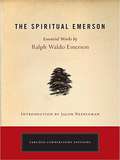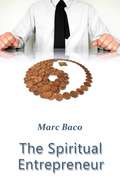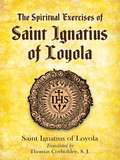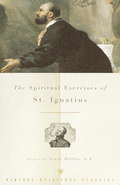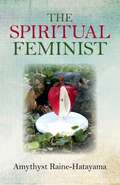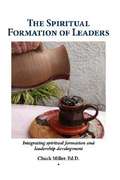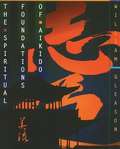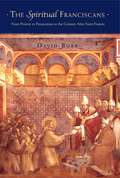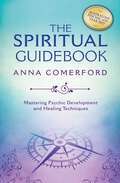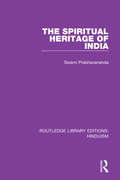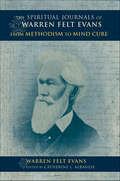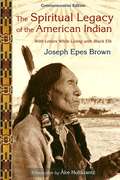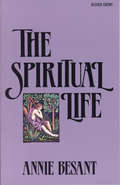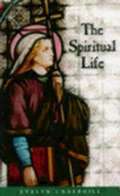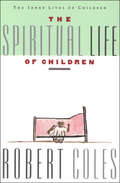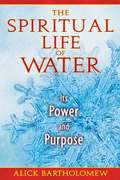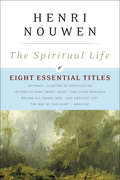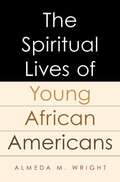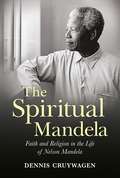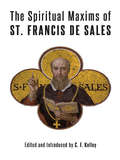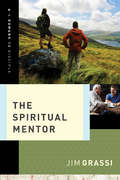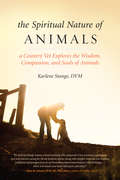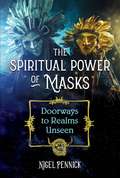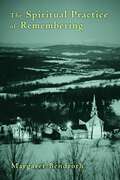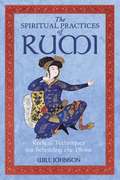- Table View
- List View
The Spiritual Emerson
by Ralph Waldo Emerson Jacob NeedlemanThis concise volume collects the core writings that have made Ralph Waldo Emerson into a key source of insight for spiritual seekers of every faith--with an introduction by the bestselling philosopher Jacob Needleman. Here is the essential collection of Emerson's spiritual thought for those readers who understand the transformative quality of ideas. It is concise and suited to years of rereading and contemplation, offering the essays that trace the arc of the inner message brought by America's "Yankee Mystic." The Spiritual Emerson features many of Emerson's landmark works. Yet also included are overlooked classics, such as the essays "Fate" and "Success," which served as major sources of inspiration to some of the leading American metaphysical thinkers of the late nineteenth and early twentieth centuries. The introduction by religious scholar and philosopher Jacob Needleman frames--historically and philosophically--the development of Emerson's thought and explores why it has such a powerful hold on us today.
The Spiritual Entrepreneur
by Marc Baco Karma Jinpa ZangmoAchieving balance between spiritual practice and the business world is a great challenge – for those who try, it may sometimes feel like attempting to mix oil and water. The Spiritual Entrepreneur by Marc Baco explores Laws of Spirituality and their implications as they relate to business. This book examines by means of four case studies how selected entrepreneurs have built their thriving businesses in accordance with their own spiritual paths. Insights and inspiration are provided for those who wish do the same.
The Spiritual Exercises of Saint Ignatius of Loyola
by Thomas Corbishley S. J. Saint Ignatius LoyolaIn this unique handbook of Christian literature, the founder of the Jesuits offers a way of "raising the mind and heart to God." Saint Ignatius of Loyola avoids setting a formula for prayer, providing readers with an extensive variety of meditative themes. Although originally intended for those making a retreat under the direction of an experienced master, the spiritual exercises have since become much more widely known and used, and they offer an excellent resource for private devotions.
The Spiritual Exercises of St. Ignatius
by Avery Dulles John F. Thornton St. Ignatius Louis J. PuhlA reissue of a classic of the Christian text from the founder of the Jesuit Order.The Spiritual Exercises of St. Ignatius of Loyla is the core work of religious formation for members of the Society of Jesus, the single largest religious order within the Roman Catholic Church. For four and a half centuries in many thousands of editions in all languages, The Exercises have embodied fundamental spiritual principles essential to authentic Christian living. The mystical insight informing Ignatius's own relationship with God--which he distilled in The Exercises--is that the divine love of God is providentially present in all the details of our existence. Here Ignatius shows how the faithful can be joined to God in all things, according to the Jesuit motto, Ad majorem Dei gloriam, "For the greater glory of God."
The Spiritual Feminist
by Amythyst Raine-HatayamaThe Spiritual Feminist empowers today's modern woman through the Goddess, connecting her to ancient matriarchal divinity and spiritual practices which invoke this energy. It embraces the essence of womanhood in its entirety, through mental, physical, and spiritual affirmations, connecting personal energy and lives through the four elements—Earth, Air, Water, & Fire, with affirmations and invocations.
The Spiritual Formation of Leaders
by Chuck Miller"The Spiritual Formation of Leaders" invites readers to deeper intimacy with Christ so, in Him, they will be empowered to enjoy rich community with one another and a life of fruitful ministry. (Christian) Chuck Miller has lived what he teaches. The book brings together spiritual formation/discipleship and leadership development. Should be required reading for every Christian leader.
The Spiritual Foundations Of Aikido
by William GleasonA leading American aikido teacher shows how this 20th-century martial art developed from the ancient spiritual traditions of Japan, not as a fighting method but rather as a means of becoming one with the laws of universal order.
The Spiritual Franciscans: From Protest to Persecution in the Century After Saint Francis (G - Reference, Information and Interdisciplinary Subjects)
by David BurrWinner of the 2002 John Gilmary Shea Prize and the 2002 Howard R. Marraro Prize of the American Catholic Historical Association. When Saint Francis of Assisi died in 1226, he left behind an order already struggling to maintain its identity. As the Church called upon Franciscans to be bishops, professors, and inquisitors, their style of life began to change. Some in the order lamented this change and insisted on observing the strict poverty practiced by Francis himself. Others were more open to compromise. Over time, this division evolved into a genuine rift, as those who argued for strict poverty were marginalized within the order. In this book, David Burr offers the first comprehensive history of the so-called Spiritual Franciscans, a protest movement within the Franciscan order. Burr shows that the movement existed more or less as a loyal opposition in the late thirteenth century, but by 1318 Pope John XXII and leaders of the order had combined to force it beyond the boundaries of legitimacy. At that point the loyal opposition turned into a heretical movement and recalcitrant friars were sent to the stake. Although much has been written about individual Spiritual Franciscan leaders, there has been no general history of the movement since 1932. Few people are equipped to tackle the voluminous documentary record and digest the sheer mass of research generated by Franciscan scholars in the last century. Burr, one of the world's leading authorities on the Franciscans, has given us a book that will define the field for years to come.
The Spiritual Guidebook: Mastering Psychic Development and Techniques
by Anna ComerfordA Perfect Practice is a step-by-step guide to help the novice practitioner establish and maintain a successful practice in their choice of modality. Full of real-life examples, this book gives you clear guidelines on how to set up your practice, promote your business and make a living by following your passion. Whether you are a brand new practitioner or an existing professional who hasn't yet reached their potential, reading this book will give you insight from BelindaGrace&’s twenty years of experience in the mind, body and spirit health and healing fields. You have put so much time, energy, effort and money into coming this far, it&’s time to turn your passionate business into personal fulfilment and professional succes
The Spiritual Heritage of India (Routledge Library Editions: Hinduism #10)
by Swami PrabhavanandaThis book, first published in 1962, is an analysis of the history of the philosophy of a country that has never distinguished philosophy from religion. Indian philosophy is not merely metaphysical speculation, but has its foundation in immediate perception. This insistence upon immediate perception rather than abstract reasoning is what distinguishes the Indian philosophy of religion from philosophy as Western nations know it.
The Spiritual Journals of Warren Felt Evans: From Methodism to Mind Cure (Religion in North America)
by Warren Felt EvansWarren Felt Evans (1817–1889) converted to Methodism while at Dartmouth College, became a minister, and spent his Methodist years as a spiritual seeker. His two extant journals, edited and annotated by Catherine L. Albanese, appear in print for the first time and reveal the inner journey of a leading American spiritual pilgrim at a critical period in his religious search. A voracious reader, he recorded accounts of intense religious experience in his journals. He moved from the Oberlin perfectionism he embraced early on, through the French quietism of Madame J. Guyon and Archbishop Fénelon, then into Swedenborgianism, spiritualism, and mind cure with distinct theosophical overtones. His carefully documented journey is suggestive of the similar journeys of the religious seekers who made their way into the burgeoning metaphysical movement at the end of the 19th century—and may shed light too on today's spirituality.
The Spiritual Legacy of the American Indian: Commemorative Edition with Letters while Living with Black Elk
by Joseph BrownThis book offers fascinating insights into the world of the pre-reservation Indians. It is a collection of classic essays that examines the universal characteristics of American Indian culture and tradition. This new edition also offers a personal view of Dr. Brown''s life and research through his private correspondence from his time on the reservation and sheds insights into his relationship with old time Indian leaders including the legendary Sioux Medicine Man Black Elk.
The Spiritual Life
by Annie BesantThe key to living spiritually in the modern world, says this classic writer, "depends upon one's attitude." The principles Besant set forth over 70 years ago are no different today. She shows that the value of the spiritual path is not in the goal but in the striving, and offers clear principles for those with the courage to try.
The Spiritual Life
by Evelyn UnderhillOriginally part of a series of broadcasts made by the author prior to World War II, this small book was meant "to present some of the great truths concerning man’s spiritual life in simple language.” As one critic has noted, “Underhill has admirably and eloquently achieved her objective.”
The Spiritual Life of Children
by Robert ColesA look at faith through the voices of children from varied religious backgrounds, by the Pulitzer-winning author of The Moral Intelligence of Children. A New York Times Notable Book What do children think about when they consider God, Heaven and Hell, the value of life in the here and now, and the inevitability of death? Child psychiatrist, Pulitzer Prize-winning writer, and Harvard professor Robert Coles spent thirty years interviewing hundreds of children—from South America and Europe to Africa and the Middle East—who are developing concepts of faith even as they struggle to understand its contradictions. Be they Catholic or Protestant, Jewish children from Boston, Pakistani children in London, agnostics, Native Americans, or young Christians in the American South, they offer honest, enlightening and sometimes startling ideas of a spiritual existence. A Hopi girl who knows for a fact that we are resurrected as birds; an African American child who believes God exists as a hurricane to &“blow away&” drug dealers; a young Christian who needs his faith to cope with the death of his sister, lest she be just &“a big heartache to us till the day we die&”; and a Tennessee child who rationalizes his belief by admitting that &“if there's no God, that's all there is, ashes.&” The Spiritual Life of Children is &“a remarkable book. The generosity of vision that characterizes Dr. Coles's enterprise enables him to create a climate where words of great beauty and truthfulness can be spoken.&” —The New York Times
The Spiritual Life of Water: Its Power and Purpose
by Alick BartholomewWater’s wisdom on renewal, communication, and holism • How water, as a conscious organism, unites all of creation in one vast communication network • Includes the research of Masaru Emoto and Viktor Schauberger • Discusses the energetics of water, water treatments, finding the best-quality water, and the perils of bottled and distilled water Once held sacred the world over, water contains a wisdom few today acknowledge. Driving everything from our metabolic processes to weather patterns and climate change, its real significance lies in its role as a medium for metamorphosis, recycling, and exchanging energy and information. Seeking a return to our ancestors’ reverence for water, Alick Bartholomew explores water’s sacred uses, its role in our bodies and environment, and the latest scientific studies to reveal that water is a conscious organism that is self-creating and self-organizing. Examining new discoveries in quantum biology, he shows how water binds all of life into one vast network of energy, allowing instant communication and coherence. Covering the research of water visionaries such as Viktor Schauberger, Mae-Wan Ho, and Masaru Emoto, he examines the memory of water and reveals how the same water has been cycling through Earth’s history since the dawn of time, making water nature’s greatest recycling and reclaiming agent. With information on the energetics of water, water treatments, finding the best-quality water, and the perils of bottled and distilled water, this book offers us a path to reclaim the spirituality of water.
The Spiritual Life: Eight Essential Titles by Henri Nouwen
by Henri J. M. NouwenHenri Nouwen, the world-renowned spiritual guide and counselor, wrote over forty books that many today consider spiritual classics. People come to Nouwen for his unique style of wisdom, and his ability to write about the life of Jesus, the love of God, and our service to others, in ways that have inspired countless people to trust God more fully. This collection includes eight of Nouwen s quintessential titles: Intimacy, A Letter of, Consolation, Letters to Marc About Jesus, The Living Reminder, Making All Things New, Our Greatest Gift, Way of the Heart, and Gracias, previously out of print, in a single beautiful, keepsake volume. "
The Spiritual Lives Of Young African Americans
by Almeda WrightHow do young African Americans approach their faith in God when continued violence and police brutality batters the news each day? In The Spiritual Lives of Young African Americans, Almeda M. Wright argues that African American youth separate their everyday lives and their spirituality into mutually exclusive categories. This results in a noticeable division between their experiences of systemic injustices and their religious beliefs and practices. Yet Wright suggests that youth can and do teach the church and society myriad lessons through their theological reflections and actions. Giving special attention to the resources of African American religious and theological traditions, Wright creates a critical pedagogy for integrating spirituality into the lives of African American youth, as well as confronting and navigating spiritual fragmentation and systemic injustice.
The Spiritual Mandela: Faith and Religion in the Life of Nelson Mandela
by Dennis CruywagenIn the first book of its kind, an acclaimed South African journalist and former parliamentary spokesperson for the ANC shares how Nelson Mandela balanced his Christian faith with his political views, exploring how the beloved leader reconciled his own beliefs with the hard truth that religion had often been used as a tool to oppress his people. ♦ "Insightful. . . a nuanced understanding of how faith influenced the renowned civil rights activist." — Publishers Weekly, starred review ". . .illuminating and an essential addition to studies of Mandela's life and work." —Booklist Nelson Mandela revealed nothing about his personal religious beliefs in his writings or in his public pronouncements. But those who were close to him know that he held Christian views. At his request, the final components of his funeral followed the Methodist service. Acclaimed journalist Dennis Cruywagen traces the spiritual component of Mandela's life, from his youth in a traditional Thembu village to his education at Wesleyan and Methodist mission schools to his time as an activist to his period on Robben Island and the years thereafter. Based on interviews with some of Mandela's close colleagues, such as Ahmed Kathrada, as well as priests and other religious figures with whom he interacted, this book unearths an unknown dimension of one of recent history's most respected men.
The Spiritual Maxims of St. Francis de Sales
by St. Francis de Sales C. F. KelleyDuring his life, Francis de Sales had a gift for giving spiritual direction to lay people living ordinary lives in the world. He firmly believed that everyone could grow in holiness, even while engaged in very active occupations, and his books and volumes of letters addressing this need remain beloved works to this day. What is the secret of their longstanding value? It is the intimacy and at the same time practicality of the saint's direction -- for he speaks to us person to person. We recognize ourselves in what is said because he speaks of those things that each of us has experienced. This collection of maxims and sayings gathered from his many pages of spiritual counsel are words of advice that every friend of St. Francis has always been fond of repeating -- words that serve as means of encouragement, points for meditation, counsels, exhortations, reminders. For St. Francis speaks as clearly to our twenty-first century condition as he did to that of his own spiritual family.
The Spiritual Mentor
by Jim GrassiThere is nothing more fundamental to the Christian faith and to building godly men than discipleship. In today's vernacular, discipleship would best be described as "Spiritual Mentoring." Why are discipleship and mentoring so important? How does discipleship connect to the struggles men face today? Discipleship is a relational process that requires people to become actively involved in their faith. Devoted and active men can change the direction of our culture. Most importantly, God has commanded men to be the leaders in the home, church, and community. Authentic discipleship is about developing a caring concern and a genuine love for others through modeling Christ-like attitudes and behavior in the context of relational environments. A fresh approach is needed to define, implement, and equip men with a passion to make disciples. It starts with relationship. Because it all starts with the individual, we must see one-on-one discipleship as the primary objective to begin the revolution. The Spiritual Mentor will explain how men can rescue their faith and how spiritual mentors must play a critical role in bringing the church back to its original purpose.Features include: Metaphors, anecdotes, and practical applications Practical tools for becoming a spiritual mentor Discussion questionsDr. Jim Grassi has captured the essence of what is happening today with men in the church and defined logical and practical steps to get back on course of men gaining a closer relationship with God in the mentoring and discipleship process. Dr. Grassi illustrates "the how to" thru practical examples of situations we all know and can relate. Dr. Grassi sets the tone for a modern day Haggai in being strong and staying courageous, putting in the effort by serving and working at the process, and lastly knowing that God never leaves your side and is always with you. This book is a must read and must have for reference of every men's ministry leader.- Darrel Billups, NCMM, Executive DirectorOur men's small group just finished reading and discussing The Spiritual Mentor. We found the book to be challenging, informative and very practical. The stories and illustrations are captivating, giving insight into principles and techniques of discipleship. As fathers and grandfathers, we want to first be a positive influence on our families and then on others with whom we come in contact. This book has raised the level of our awareness of the responsibility and opportunity to serve God in fulfilling the most important directive given us by our Lord: to make disciples. Thank you for sharing your insight and experiences with us. - Norman Thomas, Administrative Pastor, Valley Assembly
The Spiritual Nature of Animals: A Country Vet Explores the Wisdom, Compassion, and Souls of Animals
by Karlene StangeBeloved Companions, Kindred Spirits Karlene Stange’s spiritual journey began as she drove her pickup loaded with medical supplies to attend to animals throughout southwestern Colorado, where the Animas River carves the landscape. As an ambulatory veterinarian, she has experienced the challenges, sorrows, and joys of working with creatures great and small and feels a powerful kinship with these beautiful beings, a bond that goes beyond flesh and fur and feathers. The Spiritual Nature of Animals chronicles her amazing exploration through the teachings of various religious and cultural traditions, as well as her encounters with the magnificent Rocky Mountain terrain and the quirky characters — both animal and human — who inhabit it.
The Spiritual Power of Masks: Doorways to Realms Unseen
by Nigel Pennick• Reveals how mask rituals are akin to shamanic journeying and allow the mask wearer to personify an ancestral presence, spirit, deity, or power • Examines animal guising and shows how mask customs are tied to creation myths and the ancestral founders of a people, tribe, city, or nation • Looks at morris dancers and mummers in the UK, Krampuslauf and Perchtenlauf in Germanic areas, the Gorgon myths of Greece, Norse Berserker rituals, and the annual Black Forest rite to awaken ensouled masks every spring There is a spiritual power in masks that transports one into realms unseen and gives voice to things unspoken. Within the context of ritual, putting on a mask places the wearer at the intersection between the present and the past, the living and the dead, this world and the Otherworld. Masks make it possible to activate ancient archetypes, with the mask wearer reanimating or personifying an ancestral presence or spirit, a deity or power, an animal or a being of the eldritch world. In this illustrated study, Nigel Pennick explores the magical and spiritual aspects of mask wearing from ancient times to the present. He examines the many mask traditions around Europe and shows how mask rituals are similar to shamanic journeying and near-death experiences and can induce ecstatic states that allow the power signified by the mask to take possession of the individual wearing it. He also looks at the practice of dressing up as sacred animals and mask wearing as it relates to ostenta, events that occur suddenly and without warning that are considered a token or sign from the Otherworld. Unveiling the sacred power of masks, the author shows how masks allow us to transport into realms unseen, embody ancestors and otherworldly entities, and connect with traditions that stretch back to time immemorial.
The Spiritual Practice of Remembering
by Margaret BendrothWe often dismiss history as dull or irrelevant, but our modern disengagement from the past puts us fundamentally out of step with the long witness of the Christian tradition. Yet, says Margaret Bendroth, the past tense is essential to our language of faith, and without it our conversation is limited and thin.This accessible, beautifully written book presents a new argument for honoring the past. The Christian tradition gives us the powerful image of a vast communion of saints, all of God's people, both living and dead, in vital conversation with each other. This kind of connection with our ancestors in the faith, Bendroth maintains, will not happen by wishing or by accident. She argues that remembering must become a regular spiritual practice, part of the rhythm of our daily lives as we recognize our world to be, in many ways, a gift from others who have gone before.
The Spiritual Practices of Rumi: Radical Techniques for Beholding the Divine
by Will JohnsonThe secret Rumi found in beholding the Divine in his sacred relationship with Shams-i-Tabriz • Shows how, in 1244, Sufi poet and mystic Jalaluddin Rumi was first brought to a state of ecstatic union with the cosmos and all its creatures • Reveals the radical spiritual practice Rumi formulated in his private retreat with the mendicant seeker Shams-i-Tabriz • Uses the poetry and prose of Rumi to explain how to come face-to-face with the Divine One of the most extraordinary events in the history of Sufism occurred in 1244 when the Sufi poet and mystic Jalaluddin Rumi met a wandering seeker named Shams-i-Tabriz. Upon meeting, the two men immediately went into private retreat together, emerging ninety days later in a transformed condition. In The Spiritual Practices of Rumi, Will Johnson reveals the radical spiritual practice that transpired between Rumi and Shams. To put it simply, they sat and gazed into each other’s eyes. Because the eyes are portals to the soul, their sustained gazing formed the basis of a devotional practice that opened the doors to a profoundly ecstatic state of divine union. Johnson draws on the poetry and prose of Rumi to unfold his story. He also explains how one may embark on the practice of intentional gazing to experience the state of ecstatic divine union shared by Rumi and Shams so many centuries ago.
